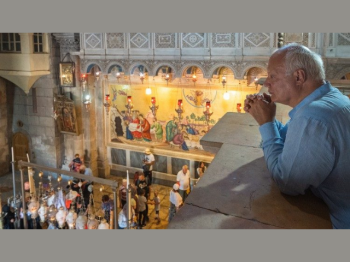To open new pathways for the Holy Land’s future

Your book The Challenge of Jerusalem [our translation] (Albin Michel publisher), is the result of an important pilgrimage you made to the Holy Land. What were the encounters that marked your spiritual journey?
First and foremost, I must speak about my encounter with the land itself, with the Middle Eastern aspect of Christianity, which contrasts with what we experience in Europe. I encountered the bucolic and pastoral dimensions of the Gospels, which give full force to the metaphors used in the Bible. Then, at the Holy Sepulchre, there was the encounter, the most important of course, the moment when I inexplicably felt the presence of Jesus. That encounter transformed my Christianity from intellectual to carnal, from choice to necessity. The Gospels had touched me deeply, and I could not stop thinking about how Christianity was different from other religions. Suddenly, this experience brought me face to face with a form of necessity, and my faith became a will to accept reality. For me, there is nothing optional about Christianity anymore. Christianity is not an option but a necessity! I must also mention two people with whom I had much contact; the first, my Jewish guide called Gila, who was extremely welcoming, and a priest, Father André, a man of faith who was both a pastor and an intellectual. Father André, who comes from the Réunion Island with other pilgrims like himself, had lived in Bethlehem serving children. From plain and simple concern for others, and with love, the emotion of his reunion with the local people showed me the importance of maintaining connections with the people of the Holy Land, as the Members of the Order of the Holy Sepulchre do.
You also met the Latin Patriarch of Jerusalem. What did your conversation focus on?
I was struck by his non-judgmental understanding of the complex and tragic situations taking place in the Holy Land. His ability to remain deeply Christian in the midst of this complexity opens up pathways for the future. In my opinion, his stance is characterized by an acceptance of coexistence and a desire to create a shared path.
Can the Holy Land belong to one people alone, or is it God’s land and therefore for everyone?
The challenge of Jerusalem is that this city calls us to be our brothers’ keepers and not our brothers’ killers. Upon this land, where Judaism and Christianity – two monotheistic religions – were founded and which is also very important for Muslims, God, after saying repeatedly, “listen to me”, “listen to me”, has withdrawn and tells us: “listen to each other”. We must take on the challenge of listening to each other.
Could the dramatic situation in the Holy Land that began on October 7, 2023, finally be a wake-up call in favour of the long-awaited peace?
I am a tragic optimist. Progress in history does not come from a desire to do good, but from a will to avoid evil. I believe that the true driving force of history is catastrophe. Catastrophe makes men react, and leads them to seek ways to prevent it from happening again. Men are not driven by a desire to do good, but by a desire to cause the least harm. In this sense, it seems to me that the absolute deadlock, the inability to live together that we are witnessing in the Holy Land, will provoke a healthy awakening – but at what cost of number of lives already? This is Immanuel Kant’s philosophy of history, who imagines ways to regulate radical evil. In his essay Perpetual Peace, published in 1795, he demonstrated that evil is at the root of progress, of what is for the better and good.
Mary of Nazareth experienced the love of the Heavenly Father for her, a love that gave her great freedom and inner peace, and allowed her to escape the world of appearances and live humbly in the light of God’s will. Did you also experience God’s love for you in the Holy Land as a source of deep peace that makes one truly free?
I must admit that this love of God for me, for us, does not give me peace but rather impresses me; I feel completely unworthy, and I am still a bit stunned by the spiritual experience I had in Jerusalem. I am still at the beginning of the journey, but I am certainly in motion, aware of my shortcomings, aware of how much further I still have to go. At its core, the heart of the pilgrim’s experience is this inner upheaval caused by the presence of the greatest love, which sets us in motion toward something different from what had been important to us until then, which directs us toward what is essential!
What message would you like to send to the Members of the Order of the Holy Sepulchre, whose inner gaze is constantly directed towards Jerusalem?
I encourage the Knights and Dames of the Order to embrace their identity. If they are fully themselves in the light – both humble and proud – then they will be transparent witnesses to the beautiful mission they have received. I truly wish for them to be proud to be humble! In this spiritual dynamic, may they become ever more mediators of peace through the moral and material support they give to the populations in need in the Holy Land.
Interview by François Vayne
(April 2025)



